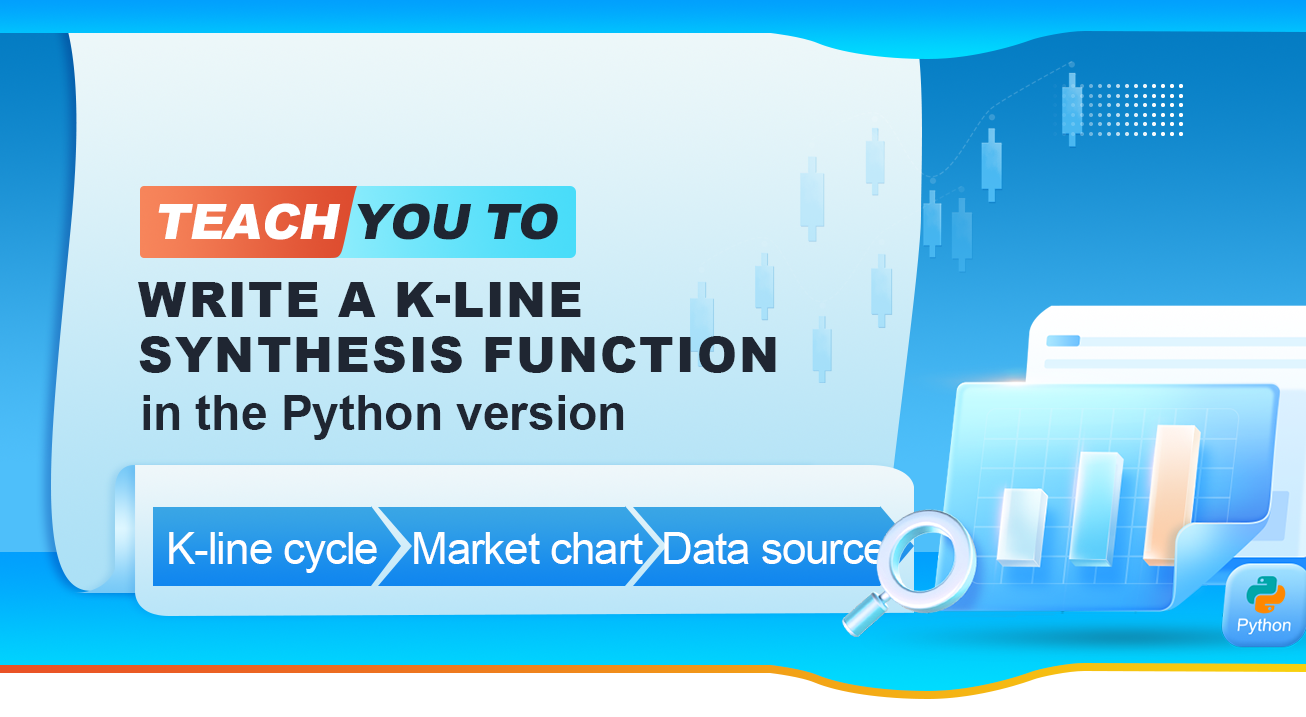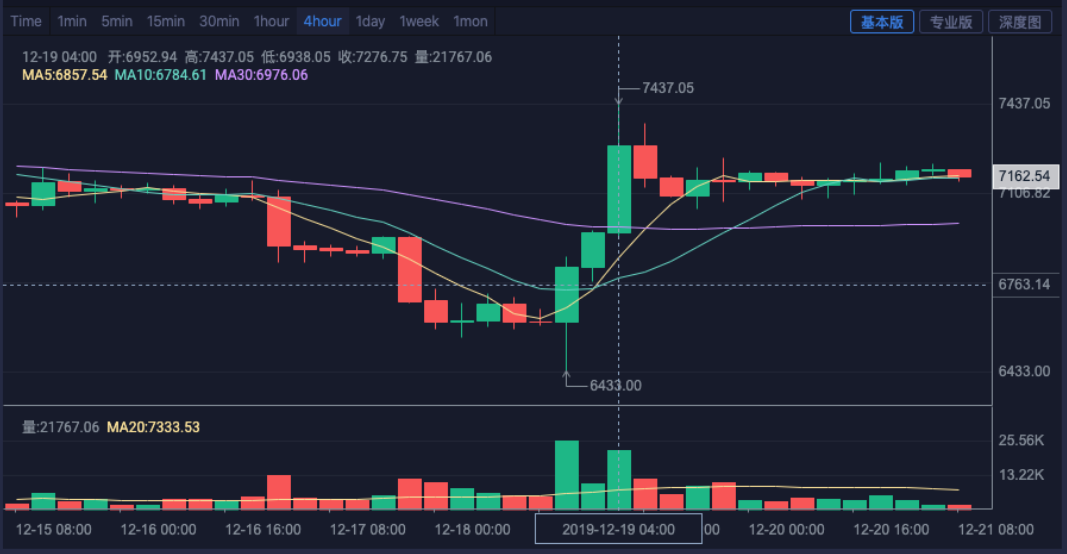Научить вас писать функцию синтеза K-линии в версии Python
Автор:FMZ~Lydia, Создано: 2022-12-26 09:28:58, Обновлено: 2024-12-15 16:36:45
Научить вас писать функцию синтеза K-линии в версии Python
При написании и использовании стратегий мы часто используем некоторые редко используемые данные периода K-линии. Однако биржи и источники данных не предоставляют данных об этих периодах. Он может быть синтезирован только с использованием данных с существующим периодом. Синтезируемый алгоритм уже имеет версию JavaScript (ссылкаНа самом деле, очень просто перенести кусок кода JavaScript в Python. Далее, давайте напишем версию алгоритма синтеза K-линий на Python.
Версия JavaScript
function GetNewCycleRecords (sourceRecords, targetCycle) { // K-line synthesis function
var ret = []
// Obtain the period of the source K-line data first
if (!sourceRecords || sourceRecords.length < 2) {
return null
}
var sourceLen = sourceRecords.length
var sourceCycle = sourceRecords[sourceLen - 1].Time - sourceRecords[sourceLen - 2].Time
if (targetCycle % sourceCycle != 0) {
Log("targetCycle:", targetCycle)
Log("sourceCycle:", sourceCycle)
throw "targetCycle is not an integral multiple of sourceCycle."
}
if ((1000 * 60 * 60) % targetCycle != 0 && (1000 * 60 * 60 * 24) % targetCycle != 0) {
Log("targetCycle:", targetCycle)
Log("sourceCycle:", sourceCycle)
Log((1000 * 60 * 60) % targetCycle, (1000 * 60 * 60 * 24) % targetCycle)
throw "targetCycle cannot complete the cycle."
}
var multiple = targetCycle / sourceCycle
var isBegin = false
var count = 0
var high = 0
var low = 0
var open = 0
var close = 0
var time = 0
var vol = 0
for (var i = 0 ; i < sourceLen ; i++) {
// Get the time zone offset value
var d = new Date()
var n = d.getTimezoneOffset()
if (((1000 * 60 * 60 * 24) - sourceRecords[i].Time % (1000 * 60 * 60 * 24) + (n * 1000 * 60)) % targetCycle == 0) {
isBegin = true
}
if (isBegin) {
if (count == 0) {
high = sourceRecords[i].High
low = sourceRecords[i].Low
open = sourceRecords[i].Open
close = sourceRecords[i].Close
time = sourceRecords[i].Time
vol = sourceRecords[i].Volume
count++
} else if (count < multiple) {
high = Math.max(high, sourceRecords[i].High)
low = Math.min(low, sourceRecords[i].Low)
close = sourceRecords[i].Close
vol += sourceRecords[i].Volume
count++
}
if (count == multiple || i == sourceLen - 1) {
ret.push({
High : high,
Low : low,
Open : open,
Close : close,
Time : time,
Volume : vol,
})
count = 0
}
}
}
return ret
}
Есть алгоритмы JavaScript. Python можно переводить и пересаживать строку за строкой. Если вы сталкиваетесь с встроенными функциями JavaScript или врожденными методами, вы можете перейти в Python, чтобы найти соответствующие методы. Поэтому миграция проста.
Логика алгоритма точно такая же, за исключением того, что функции JavaScript вызываютvar n=d.getTimezoneOffset()При миграции на Python,n=time.altzoneДругие различия только с точки зрения языковой грамматики (например, использование для петл, булевых значений, логического AND, логического NOT, логического OR и т. Д.).
Мигрированный код Python:
import time
def GetNewCycleRecords(sourceRecords, targetCycle):
ret = []
# Obtain the period of the source K-line data first
if not sourceRecords or len(sourceRecords) < 2 :
return None
sourceLen = len(sourceRecords)
sourceCycle = sourceRecords[-1]["Time"] - sourceRecords[-2]["Time"]
if targetCycle % sourceCycle != 0 :
Log("targetCycle:", targetCycle)
Log("sourceCycle:", sourceCycle)
raise "targetCycle is not an integral multiple of sourceCycle."
if (1000 * 60 * 60) % targetCycle != 0 and (1000 * 60 * 60 * 24) % targetCycle != 0 :
Log("targetCycle:", targetCycle)
Log("sourceCycle:", sourceCycle)
Log((1000 * 60 * 60) % targetCycle, (1000 * 60 * 60 * 24) % targetCycle)
raise "targetCycle cannot complete the cycle."
multiple = targetCycle / sourceCycle
isBegin = False
count = 0
barHigh = 0
barLow = 0
barOpen = 0
barClose = 0
barTime = 0
barVol = 0
for i in range(sourceLen) :
# Get the time zone offset value
n = time.altzone
if ((1000 * 60 * 60 * 24) - (sourceRecords[i]["Time"] * 1000) % (1000 * 60 * 60 * 24) + (n * 1000)) % targetCycle == 0 :
isBegin = True
if isBegin :
if count == 0 :
barHigh = sourceRecords[i]["High"]
barLow = sourceRecords[i]["Low"]
barOpen = sourceRecords[i]["Open"]
barClose = sourceRecords[i]["Close"]
barTime = sourceRecords[i]["Time"]
barVol = sourceRecords[i]["Volume"]
count += 1
elif count < multiple :
barHigh = max(barHigh, sourceRecords[i]["High"])
barLow = min(barLow, sourceRecords[i]["Low"])
barClose = sourceRecords[i]["Close"]
barVol += sourceRecords[i]["Volume"]
count += 1
if count == multiple or i == sourceLen - 1 :
ret.append({
"High" : barHigh,
"Low" : barLow,
"Open" : barOpen,
"Close" : barClose,
"Time" : barTime,
"Volume" : barVol,
})
count = 0
return ret
# Test
def main():
while True:
r = exchange.GetRecords()
r2 = GetNewCycleRecords(r, 1000 * 60 * 60 * 4)
ext.PlotRecords(r2, "r2")
Sleep(1000)
Испытание
График рынка Huobi

4-часовой график синтеза обратного теста

Если вышеуказанный код используется в конкретных стратегиях, пожалуйста, модифицируйте и испытывайте его в соответствии с конкретными требованиями. Если есть ошибка или предложение по улучшению, пожалуйста, оставьте сообщение.
- Введение в арбитраж с задержкой свинца в криптовалюте (2)
- Презентация о своде Lead-Lag в цифровой валюте (2)
- Обсуждение по внешнему приему сигналов платформы FMZ: полное решение для приема сигналов с встроенным сервисом Http в стратегии
- Обзор приема внешних сигналов на платформе FMZ: стратегию полного решения приема сигналов встроенного сервиса HTTP
- Введение в арбитраж с задержкой свинца в криптовалюте (1)
- Введение Lead-Lag в цифровой валюте (1)
- Дискуссия по внешнему приему сигнала платформы FMZ: расширенный API VS стратегия встроенного HTTP-сервиса
- Обзор FMZ-платформы для получения внешних сигналов: расширение API против стратегии встроенного HTTP-сервиса
- Обсуждение метода тестирования стратегии на основе генератора случайных тикеров
- Исследование методов тестирования стратегии на основе генератора случайных рынков
- Новая функция FMZ Quant: Используйте функцию _Serve для простого создания HTTP-сервисов
- Торговля парами на основе технологии, основанной на данных
- Применение технологии машинного обучения в торговле
- Использовать исследовательскую среду для анализа деталей треугольного хеджирования и влияния комиссий за обработку на ценовую разницу хеджируемого
- Реформа фьючерсного API Deribit для адаптации к количественной торговле опционами
- Лучшие инструменты делают хорошую работу - научитесь использовать исследовательскую среду для анализа принципов торговли
- Стратегии хеджирования с использованием кросс-валюты при количественной торговле блокчейн-активами
- Приобрести руководство по стратегии цифровой валюты FMex на FMZ Quant
- Научить писать стратегии - трансплантировать стратегию MyLanguage (продвинутое)
- Научить писать стратегии - пересадить стратегию MyLanguage
- Научить вас добавить поддержку многографика к стратегии
- Анализ стратегии Дончианского канала в исследовательской среде
- Когда FMZ сталкивается с ChatGPT, вспомните о попытке использовать AI для обучения количественной транзакции
- Изготовленный инструмент количественной торговли опционами на цифровую валюту
- Простая стратегия сетки в версии Python
- Линейная стратегия потока ожидаемых заказов, разработанная на основе функции воспроизведения данных
- Стратегия покупки победителей версии Python
- FMZ Journey - с Стратегией перехода
- Научить вас преобразовывать одновидовую стратегию Python в многовидовую
- Реализовать количественный торговый робот с заданным временем старта или остановки гаджета с помощью Python
- Oak учит использовать JS для интерфейса с расширенным API FMZ